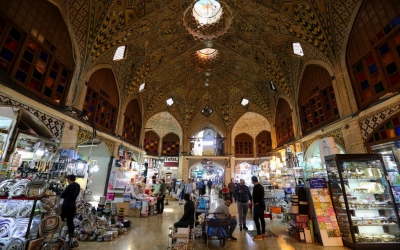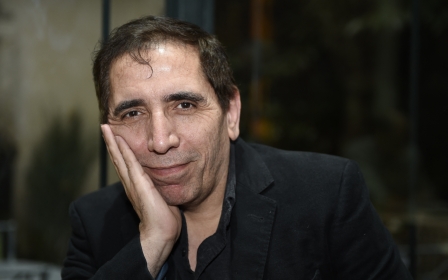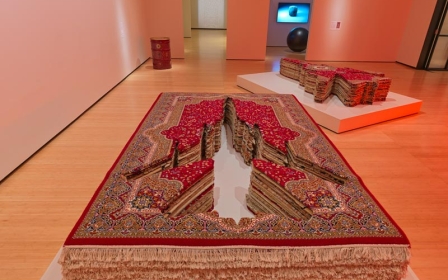Tehran: Israeli propaganda series has the opposite of its intended effect

Vulgar is the first, last, and only word that sticks in your mind if, out of professional duty, you sit and suffer through a truly atrocious piece of loutish propaganda called Tehran - an Israeli spy thriller created for Israeli and American audiences.
Ordinarily, such gaudy pieces of puffery produced by the Israeli or Iranian governments against each other are consumed locally, and no one outside Israel or Iran pays any attention to them. But when Apple TV chooses to show the Israeli spoof - but not the Iranian version - then we have quite a situation.
The best of Iranian cinema is scarcely seen in the United States, yet the worst Israeli shows are featured on primetime cable TV. While the worst Iranian propaganda films, fortunately, stay in Iran, the best of Israeli cinema is lost in the garbage heap the Zionists regularly spin-off and send to their American supporters. It is not accidental that Israel behaves like the extended colonial outpost of the US empire; it must in all manners act the role.
Neither the Israeli, nor indeed the Iranian, intelligence apparatus could possibly be as stupid as this show portrays them to be
Israel is a settler-colony with all sorts of atrocities attending its very name. But Israel also has some excellent filmmakers: Amos Gitai, Ari Folman, Avi Mograbi, and Eyal Sivan are chief among them.
Sometimes, even top-notch Palestinian directors are ticketed as “Israeli filmmakers” because they are born and raised in the settler-colony that has occupied their homeland.
New MEE newsletter: Jerusalem Dispatch
Sign up to get the latest insights and analysis on Israel-Palestine, alongside Turkey Unpacked and other MEE newsletters
But then there are the film or television projects made in the service of Israel’s propaganda machinery, also known as "hasbara". Shows like Tehran are meant to demonise Iran and lionise Israel - but what this and similar shows systematically fail to understand is that such pieces of public embarrassment do precisely the opposite of what they intend. They do not persuade anyone of anything, but rather reveal the depth of the settler-colony’s desperation.
Tehran is so terrible, so vulgar, that it is as if the Iranian intelligence apparatus and the Revolutionary Guards had produced it to show how inane and desperate Israelis are. Neither the Israeli nor indeed the Iranian intelligence apparatus could possibly be as stupid as this show portrays them to be.
Threadbare plot
A truly sad and pathetic thing in the most recent season of Tehran is to watch the gifted American actor Glenn Close padding her bank account by agreeing to appear scarved and fake-Persian.
“It was very challenging,” Close is reported to have said of learning Persian. “It has a different sentence structure. It’s more like German, with the verb at the end. You use your mouth differently. It has certain sounds that we don’t have in English. But I had a phenomenal coach in Anna Bayat, who worked with me on Zoom three times a week.”
That is truly embarrassing, to go from Marquise Isabelle de Merteuil in Dangerous Liaisons (1988) - and countless other stellar performances - to this.
There is very little to be said about the threadbare plot of Tehran, which takes full advantage of current headlines.
For example, recent news about Iran arresting “a network of agents working for Israel who entered Iran from Iraq’s Kurdish region to carry out sabotage” is the stuff of Tehran’s scriptwriters. But I’d rather read the ghastly news than see what Israeli hasbara does with it on-screen.
Tehran features the story of Tamar Rabinyan, a young woman born in Iran and raised in Israel who is now a Mossad agent sent undercover to the Iranian capital to hack into the computer of a nuclear reactor to disable it and enable Israel’s bombing of the site.
Meanwhile, Iranian security and intelligence officials are on her case, and things begin to get complicated.
The series is reminiscent of Homeland, which for a decade sustained the course of demonising Islam and Muslims for Israeli and American audiences - actively camouflaging the real threat to US security, which is the rampant white supremacist movement that gained ascendancy during the Trump presidency, culminating in the 6 January 2021 attempted coup.
The entire spectacle of the “Iran nuclear threat” is a bad joke, especially when manufactured amid the supreme hypocrisy of Israel sitting on a massive stockpile of nuclear arms.
Important films
In both Iran and Israel, there are rude propaganda films, and there are reasonable and important films made about their nemeses. Mohsen Makhmalbaf made his film The Gardener (2012) in Israel. One may, as one should, object to Makhmalbaf’s disregard for the boycott, divestment, and sanctions (BDS) movement, but the film itself is squarely within his crucial oeuvre. Major Iranian films are regularly screened in Israel, some for propagandistic anti-Iran reasons, and others for perfectly legitimate reasons in the interest of Israeli film enthusiasts.
And not all Israeli films about Iran are of the hasbara genre. Yuval Delshad’s Persian-language feature film Baba Joon (2015) explores the lives of Iranians who have immigrated to Israel. For better or worse, thousands of Iranian Jews have left their ancestral homeland in Iran and moved to Israel. Like their Arab counterparts, they deeply love their country of origin and continue to celebrate their traditions.
Iran is a far richer culture than can be portrayed by either lurid propaganda films or some of its greatest cinematic achievements
In Iranian cinema over the last few decades, Israel has also had a significant presence. The iconic Iranian filmmaker Masoud Kimiai led a cast of major Iranian actors in The Lead (1989), about a young Iranian Jewish couple who want to immigrate to Israel. Habib Kavosh in Hidden Fire (1990) explored the inner dynamics of the Palestinian liberation movement in Lebanon, while Seifollah Dad turned Ghassan Kanafani’s legendary novella Returning to Haifa into a film called The Survivor (1995).
And the list goes on, with some films made out of love and solidarity for Palestinians, others as inane propaganda against Israel, and still others exploring the fate of Iranian Jews.
But who cares about this richer and more important background? Tehran is what it is - a ridiculous piece of propaganda entirely befitting of the phony Zionist project.
Iran is a far richer culture than can be portrayed by either lurid propaganda films or some of its greatest cinematic achievements. Israel is a tiny settler-colony with scarcely enough breathing room for human beings to work and create outside the box of colonial ideology.
But within the very selfsame Israel, Palestinian cinema has emerged as a monumental testament to the sustained struggle of a people beyond the reach of their tormentors. The best of Palestinian cinema succeeds where dozens of pieces of gibberish like Tehran fail.
The views expressed in this article belong to the author and do not necessarily reflect the editorial policy of Middle East Eye.
Middle East Eye delivers independent and unrivalled coverage and analysis of the Middle East, North Africa and beyond. To learn more about republishing this content and the associated fees, please fill out this form. More about MEE can be found here.






